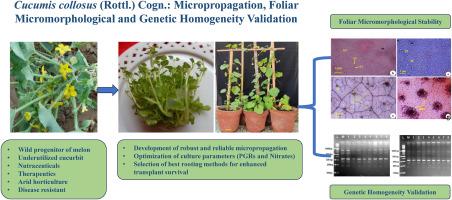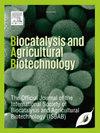Micropropagation, micromorphological evaluation and genetic homogeneity validation of Cucumis collosus (Rottl.) Cogn.: A wild progenitor of melon
IF 3.4
Q2 BIOTECHNOLOGY & APPLIED MICROBIOLOGY
引用次数: 0
Abstract
Cucumis collosus (Rottl.) Cogn., a wild ancestor of melon cultivars, is an underutilized cucurbit of arid horticulture having nutraceutical and therapeutic significance. C. collosus has great potential for enhancing the genetic base of cultivated melon and other cucurbits. This investigation is the first report on a robust and reliable micropropagation system for C. collosus (var. AHK-119) using nodal explants, followed by micromorphological and genetic stability assessment. More than 95% explants showed axillary shoot-bud induction on MS (Murashige and Skoog, 1962) medium containing 0.5 mg L−1 BAP and developed a maximum of 3.2 ± 0.6 shoots measuring 3.2 ± 0.1 cm length. After evaluating the various parameters, the best shoot multiplication (Shoot Number 34.9 ± 1.7, Shoot Length 6.7 ± 0.9 cm) was achieved on MS medium having half-strength of nitrates (825 mg L−1 NH4NO3 and 950 mg L−1 KNO3) + 0.25 mg L−1 6-benzylaminopurine (BAP) + 0.1 mg L−1 Kinetin (Kin) + 0.1 mg L−1 Indole-3-acetic acid (IAA) + additives (50 mg L−1 ascorbic acid and 25 mg L−1 each of adenine sulfate, L-arginine and citric acid), after 4 weeks. Micro-shoots were rooted using three approaches: In Vitro Continuous Treatment (IVCT), In Vitro Pulse-Treatment (IVPT) and Ex Vitro Pulse Treatment (EVPT). Of these, EVPT approach proved to be most successful in terms of rooting response (80%), root number (6.4 ± 0.9) and root length (5.7 ± 0.7 cm). The foliar micro-morphology analysis of in vitro leaves (IVL), ex vitro leaves (EVL) and mother plant leaves (MPL) demonstrated notable adaptive alterations during the transitional stages and produced structurally stable plants similar to the mother plant. Furthermore, the validation of genetic homogeneity using Start Codon Targeted (SCoT) and Inter Simple Sequence Repeats (ISSR) markers revealed monomorphic banding patterns among the micropropagated and the mother plant. The discussed method can be applied for large-scale commercial production of C. collosus for arid horticulture, urban/vertical farming, breeding purposes and improvement of other cucurbits.

Cucumis collosus (Rottl.) Cogn.的微繁殖、微形态学评价和遗传同质性验证..:甜瓜的野生祖先
Cucumis collosus (Rottl.) Cogn.是甜瓜栽培品种的野生祖先,是一种未得到充分利用的干旱园艺葫芦科植物,具有营养保健和治疗意义。C. collosus 在提高栽培甜瓜和其他葫芦科植物的遗传基础方面具有巨大潜力。本研究首次报道了利用节间外植体对 C. collosus(变种 AHK-119)进行稳健可靠的微繁殖系统,随后进行了微形态和遗传稳定性评估。在含有 0.5 mg L-1 BAP 的 MS(Murashige 和 Skoog,1962 年)培养基上,95% 以上的外植体表现出腋芽芽诱导,最多发育出 3.2 ± 0.6 个芽,长度为 3.2 ± 0.1 厘米。在对各种参数进行评估后,在含有半强度硝酸盐(825 毫克/升-1 NH4NO3 和 950 毫克/升-1 KNO3)+ 0.25 mg L-1 6-苄基氨基嘌呤(BAP)+ 0.1 mg L-1 苦参碱(Kin)+ 0.1 mg L-1 吲哚-3-乙酸(IAA)+添加剂(50 mg L-1 抗坏血酸和 25 mg L-1 硫酸腺嘌呤、L-精氨酸和柠檬酸),4 周后。微芽生根有三种方法:体外连续处理法(IVCT)、体外脉冲处理法(IVPT)和体外脉冲处理法(EVPT)。其中,EVPT 方法在生根反应(80%)、根数(6.4 ± 0.9)和根长(5.7 ± 0.7 厘米)方面最为成功。对离体叶片(IVL)、离体叶片(EVL)和母株叶片(MPL)进行的叶片微形态分析表明,在过渡阶段出现了显著的适应性变化,并产生了结构稳定、与母株相似的植株。此外,利用起始密码子定向标记(SCoT)和简单序列间重复标记(ISSR)验证遗传同质性,发现微繁殖植株和母株之间存在单形带模式。所讨论的方法可用于干旱园艺、城市/垂直农业、育种目的和其他葫芦科植物改良的大规模商业化生产。
本文章由计算机程序翻译,如有差异,请以英文原文为准。
求助全文
约1分钟内获得全文
求助全文
来源期刊

Biocatalysis and agricultural biotechnology
Agricultural and Biological Sciences-Agronomy and Crop Science
CiteScore
7.70
自引率
2.50%
发文量
308
审稿时长
48 days
期刊介绍:
Biocatalysis and Agricultural Biotechnology is the official journal of the International Society of Biocatalysis and Agricultural Biotechnology (ISBAB). The journal publishes high quality articles especially in the science and technology of biocatalysis, bioprocesses, agricultural biotechnology, biomedical biotechnology, and, if appropriate, from other related areas of biotechnology. The journal will publish peer-reviewed basic and applied research papers, authoritative reviews, and feature articles. The scope of the journal encompasses the research, industrial, and commercial aspects of biotechnology, including the areas of: biocatalysis; bioprocesses; food and agriculture; genetic engineering; molecular biology; healthcare and pharmaceuticals; biofuels; genomics; nanotechnology; environment and biodiversity; and bioremediation.
 求助内容:
求助内容: 应助结果提醒方式:
应助结果提醒方式:


